By Nancy Jaffer
December 6, 2017
Donna Strait Martin personifies staying power, a virtue as important in people as it is in horses.
Her lifelong dedication to equestrian sport remains productive. While there are 700 U.S. Equestrian Federation-recognized hunter judges (many of whom, like Donna, also judge jumpers and equitation), she is among only 20 who have held their licenses for 50 years.
Always impeccably organized and turned out, the Pottersville resident is one who not only respects the history of her sport, but also emphasizes its best traditions.
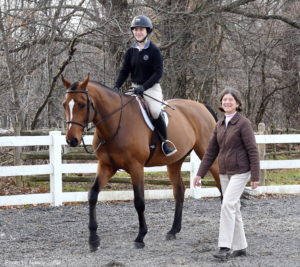
Donna Martin’s expertise has contributed to the success of her granddaughter, Morgan Munz, in the show ring. (Photo by Nancy Jaffer)
Ever since she began teaching young people to ride, Donna stressed the importance of a firm foundation, while insisting on a broad grounding in horse care as well. Her record has earned her the U.S. Hunter Jumper Association’s Jane Marshall Dillon Award East, to be presented Dec. 12 at the organization’s annual meeting in San Antonio, Texas.
The honor goes to trainers who pass on the values exemplified by Mrs. Dillon, while eventually sending well-schooled students to other instructors who can hone their skills when they become more advanced are ready for the next level. (Misty Morgan, president of the Arkansas Hunter/Jumper Association, won the Dillon Award West.)
Interestingly, Donna actually rode at the Junior Equitation School in Vienna, Va., with its founder, Mrs. Dillon, famous for her book, “School for Young Riders.”
Although Donna called Basking Ridge home much of the time while she was growing up, her father, World War II fighter ace Air Force Brigadier Gen. Donald Strait, was regularly transferred to bases around the country. When her dad was at the Pentagon in Washington D.C., Donna took lessons from Mrs. Dillon at the same time as Kathy Kusner, who became a U.S. team member and medaled in the Olympics. (Joe Fargis, the 1984 U.S. Olympic show jumping double gold medalist, also was taught by Jane Marshall Dillon.)
“I loved riding with her,” Donna said of Mrs. Dillon.
“She emphasized really great equitation, natural feel—nobody counted strides in those days. She ran a tight ship. We took care of our own horses,” Donna said.
“It was a beautiful farm, with rolling hills and lots of natural jumps. It was such a great time. We’d go foxhunting, go riding with a group of kids; you’d go into the brooks, ride bareback with a halter and shank, things that kids don’t do nowadays.”
Donna got started on the road to her life’s work by something that could have ended as a tragedy. Most people today don’t remember the fear polio (also known as infantile paralysis) struck into the hearts of parents before the mid-1950s, when Dr. Jonas Salk came up with the vaccine that stopped the disease short. It affected so many young children and some adults as well. (President Franklin Delano Roosevelt was among its victims.)
Donna contracted polio at the age of four.
“I hardly walked for a year,” she recalled.
“My mother carried me or I was in the stroller (while) my young brother walked.
“By the time I turned five, I was ready to be more active,” said Donna, for whom riding lessons with the legendary Clarence Nagro became therapy.
The master of Hilltop Farm in New Vernon, Clarence trained many top young riders, and Donna was among them. She competed in the ASPCA Maclay and AHSA (now USEF) Medal finals, and won many championships with her classic style and ability to get the most out of a horse.
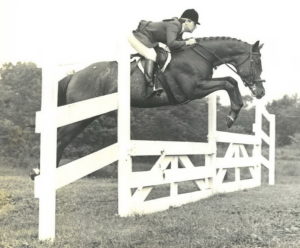
Donna on Royal Audience at Hunt Cap Farm in 1973.
Sally Ike, now the USEF managing director of licensed officials, competed against Donna during their teenage showing days. Remembering Blue Mermaid, Donna’s rather hot thoroughbred, Sally said, “She had to be very tactful” to get the best out of the mare, which she did.
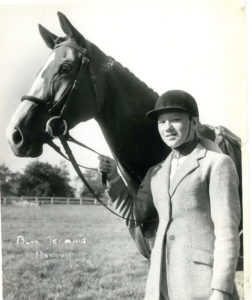
Donna and Blue Mermaid in their glory days.
Married at 19 to Jim “Red” Martin, a year later, Donna walked across the street from her home to the new Purnell School in Pottersville and was hired as the riding instructor, with a gig handling field hockey as well.
Donna took care of the horses in addition to teaching. She remains as the liaison for Purnell’s riding program, which eventually was moved off-campus, and still works in the school’s fundraising department.
“I never left,” she noted, observing she has no thoughts of retiring. “Being around young people is what keeps you young and knowledgeable about today, the day that you’re living in.”
Donna, who teaches two days a week at Centenary University, guided the riding of her daughter, Kelly Martin Munz, a USEF steward and chairman of the equine studies department at Centenary. She also worked with Kelly’s daughters, Maggie, a student at the College of Charleston, and Morgan, 16. Donna believes the teenager, who attends Purnell, “is traveling a path that horses are in her future.”
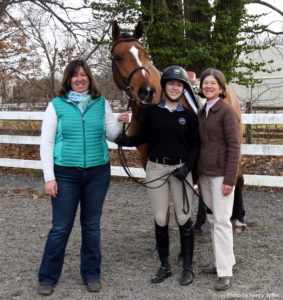
Donna Martin, right, with her daughter, Kelly Martin Munz and granddaughter Morgan Munz. (Photo by Nancy Jaffer)
Morgan, who won a class at the College Preparatory Invitational show in Florida last year, said her grandmother “always taught me to be proper, doing it the right way, the George Morris way. She was there at every show. We were always early, no matter what.
“She gave me the fundamentals of riding, then sent me off to someone else to better myself,” commented Morgan. While she now rides with Ashley DiBongrazio, Donna is still at the shows with her. She was involved with helping produce Morgan’s horse, Louis, who came from Germany as a three-year-old and has matured into a lovely five-year-old. Grandma usually is the first person Morgan calls when she has a question about something to do with the horse.
Elizabeth Bugliari rode with Donna since she was in pigtails during their days at Hilltop.
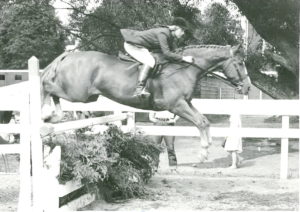
Donna on Escapade at Hilltop Stable in New Vernon in 1963.
“She reads people extremely well,” said Elizabeth. “She’s a very good teacher.”
Elizabeth recalled how Donna adjusted to her students’ needs, but didn’t brook any nonsense.
“She has a wonderful no-nonsense way of dealing with kids. They soon learned, `We do it Donna’s way. Someone who knew Donna called her Donna Direct, because you get it right straight from the shoulder with her.”
Elizabeth, who worked at Purnell and now is director of development and alumnae relations at Kent Place School in Summit, explained that “If you were going to earn your stripes with Donna, you had to do it right. She’s the kind of person you want judging a show. She wasn’t going to be impressed by a name.”
Another of Donna’s virtues is modesty. When she was notified about the award, her response was, “Really? Me? Are you sure you have the right person? I was flabbergasted.”
Looking back at her long career, however, it’s easy to see why the award is so well-deserved.
“She was always the same, the stable, calm person that I see now,” said Sally.
“Isn’t it great that she’s still doing what she’s doing, doing a great job and contributing to the sport.”



